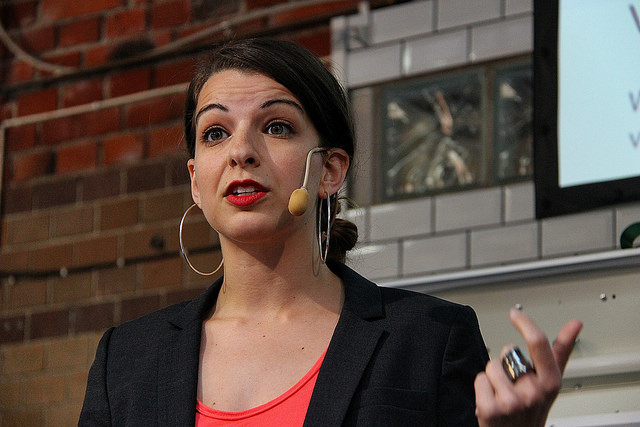By Gwen Schanker, News Staff
Depending on who you talk to, the GamerGate controversy – characterized by the Internet slogan #GamerGate – is either about ethics in game journalism or harassment of women in gaming. Whatever the definition, one thing is certain: it’s personal.
Last Wednesday, video game developers Brianna Wu and Amanda Wagner, cofounders of the Boston-based gaming company Giant Spacekat, visited campus. They spoke to an audience of nearly 100 Northeastern students and faculty about the highly contentious GamerGate controversy, which kicked into high gear in August. Wu and Wagner were originally slated to discuss the development of their brainchild Revolution 60, a game released in July, but the topic of conversation changed to GamerGate when Wu was subjected to a series of death threats last month.
“The threats against me are not a joke,” Wu said of the experience. “My life is genuinely in danger.”
While many would say that the controversy started with a violation of journalistic ethics, many female game developers would beg to differ.
“It’s been a misogynist movement from the very beginning,” Wu said.
She traces the start of GamerGate back to an incident two years ago involving Anita Sarkeesian, who was attempting to get funding for her video web series Feminist Frequency. The web series explores the representation of women in pop culture. Sarkeesian was subjected to “violent threats” and from there, “the culture against women started to gel,” Wu said.
The catalyst for GamerGate as it exists today was a wave of online threats in August aimed against indie game developer Zoe Quinn. For Wu and Wagner, this was essentially an Internet campaign against women in the industry. Quinn was accused of having a relationship with a male gaming journalist that led to positive coverage of her work and was subsequently subjected to sexist harassment, suggesting the praise was a result of a sexual relationship rather than rightly earned.
“When they started going after my friends, that’s when I realized we really had to stand up and do something,” Wu said.
Wu published a series of tweets in support of Quinn and the rest of her female colleagues, which brought her attention from the #GamerGate crowd. The anonymous release of her home address via Twitter, and a subsequent series of death threats, forced Wu and her husband to leave their home in favor of a safer location.
However, Wu did not let the incident silence her. She has since been interviewed by The New York Times and The Guardian and has appeared on both NBC and CSNBC to speak on behalf of women in the industry.
“This is my field. I’m a professional,” she said. “I think I managed to be a symbol for a lot of women out there.”
For Wu, GamerGate represents a permanent hostility towards female game developers that has been going on for years.
“The culture of the industry is set from the top down,” she said. “This is a space for men. Women are not welcome.”
GamerGate has brought these issues to a point where they are getting more difficult to ignore.
“The industry is very hostile to women in ways that people aren’t thinking about or talking about,” Wu said. “We, as an industry, need to stand up and address this.”
For Wagner, the lead animator of Giant Spacekat and Wu’s colleague and close friend, GamerGate represents a “constant, low-grade fear.”
“People like me see this occur and are rendered too afraid to say anything at all,” Wagner said. “I feel like by standing here today I am inviting danger into my home.”
Like Wu, Wagner feels that sharing her experience is important for gaining support from a wider audience of both males and females.
“I was really hoping to humanize it,” she said of her participation in the Northeastern event. “It’s one thing to read about it, but it’s another thing to have a human face. It’s not just some abstract thing that happens to other people.”
Kara Braciale, a professor of foundation and web development at Northeastern, had originally invited the developers to speak to her Interactive Foundation class to discuss techniques in game making.
“They had already agreed to come speak and the whole GamerGate thing blew up,” Braciale said. “I thought it was important that they could come to a safe place in public.”
Students that attended the event were impressed with the developers’ passion and audacity.
“There’s a lot that people don’t know about it,” Teresa Sweeney, a third-year design major, said, referring to the “crazy prejudice against women” that GamerGate involves. “I appreciate their bravery.”
For Jeff Robbins, a third-year computer science and game design major, the event was an opportunity to get all of the facts from an expert in the field.
“We’re in the middle of a turning point in the games industry, [and] pushing any demographic out of the industry is going to hurt it,” Robbins said. “I thought it was important for me to get an accurate view of what happened.”
Wu said she is honored to serve as a symbol of success for women in the games industry and to be part of a support network for those who choose to join her.
“The only thing I’ve found that helps with being a woman in this field is making friends with other women,” she said. “If you choose not to enter this field, the bullies are winning.”
Photo courtesy theglobalpanorama, Creative Commons









